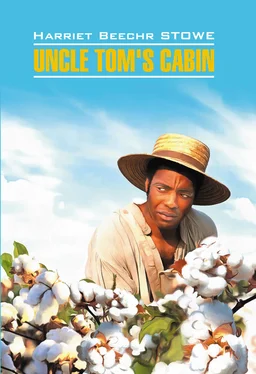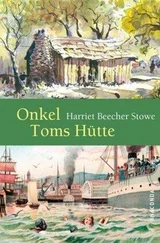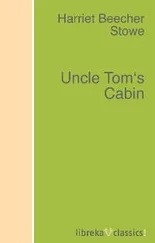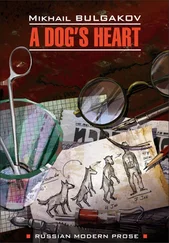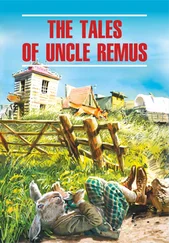“Give way, George; go with him for the present. We’ll try to help you, yet.”
The tyrant observed the whisper, and conjectured its import, though he could not hear what was said; and he inwardly strengthened himself in his determination to keep the power he possessed over his victim.
George was taken home, and put to the meanest drudgery of the farm. He had been able to repress every disrespectful word; but the flashing eye, the gloomy and troubled brow, were part of a natural language that could not be repressed, – indubitable signs, which showed too plainly that the man could not become a thing.
It was during the happy period of his employment in the factory that George had seen and married his wife. During that period, – being much trusted and favored by his employer, – he had free liberty to come and go at discretion. The marriage was highly approved of by Mrs. Shelby, who, with a little womanly complacency in matchmaking, felt pleased to unite her handsome favorite with one of her own class who seemed in every way suited to her; and so they were married in her mistress’ great parlor, and her mistress herself adorned the bride’s beautiful hair with orange-blossoms, and threw over it the bridal veil, which certainly could scarce have rested on a fairer head; and there was no lack of white gloves, and cake and wine, – of admiring guests to praise the bride’s beauty, and her mistress’ indulgence and liberality. For a year or two Eliza saw her husband frequently, and there was nothing to interrupt their happiness, except the loss of two infant children, to whom she was passionately attached, and whom she mourned with a grief so intense as to call for gentle remonstrance from her mistress, who sought, with maternal anxiety, to direct her naturally passionate feelings within the bounds of reason and religion.
After the birth of little Harry, however, she had gradually become tranquillized and settled; and every bleeding tie and throbbing nerve, once more entwined with that little life, seemed to become sound and healthful, and Eliza was a happy woman up to the time that her husband was rudely torn from his kind employer, and brought under the iron sway of his legal owner.
The manufacturer, true to his word, visited Mr. Harris a week or two after George had been taken away, when, as he hoped, the heat of the occasion had passed away, and tried every possible inducement to lead him to restore him to his former employment.
“You need n’t trouble yourself to talk any longer,” said he, doggedly; “I know my own business, sir.”
“I did not presume to interfere with it, sir. I only thought that you might think it for your interest to let your man to us on the terms proposed.”
“O, I understand the matter well enough. I saw your winking and whispering, the day I took him out of the factory; but you don’t come it over me that way. It’s a free country, sir; the man’s mine, and I do what I please with him, – that’s it!”
And so fell George’s last hope; – nothing before him but a life of toil and drudgery, rendered more bitter by every little smarting vexation and indignity which tyrannical ingenuity could devise.
A very humane jurist once said, The worst use you can put a man to is to hang him. No; there is another use that a man can be put to that is WORSE!
III
The Husband and Father
Mrs. Shelby had gone on her visit, and Eliza stood in the verandah, rather dejectedly looking after the retreating carriage, when a hand was laid on her shoulder. She turned, and a bright smile lighted up her fine eyes.
“George, is it you? How you frightened me! Well; I am so glad you ’s come! Missis is gone to spend the afternoon; so come into my little room, and we’ll have the time all to ourselves.”
Saying this, she drew him into a neat little apartment opening on the verandah, where she generally sat at her sewing, within call of her mistress.
“How glad I am! – why don’t you smile? – and look at Harry – how he grows.” The boy stood shyly regarding his father through his curls, holding close to the skirts of his mother’s dress. “Is n’t he beautiful?” said Eliza, lifting his long curls and kissing him.
“I wish he’d never been born!” said George, bitterly. “I wish I’d never been born myself!”
Surprised and frightened, Eliza sat down, leaned her head on her husband’s shoulder, and burst into tears.
“There now, Eliza, it’s too bad for me to make you feel so, poor girl!” said he, fondly; “it’s too bad. O, how I wish you never had seen me – you might have been happy!”
“George! George! how can you talk so? What dreadful thing has happened, or is going to happen? I’m sure we’ve been very happy, till lately.”
“So we have, dear,” said George. Then drawing his child on his knee, he gazed intently on his glorious dark eyes, and passed his hands through his long curls.
“Just like you, Eliza; and you are the handsomest woman I ever saw, and the best one I ever wish to see; but, oh, I wish I’d never seen you, nor you me!”
“O, George, how can you!”
“Yes, Eliza, it’s all misery, misery, misery! My life is bitter as wormwood; the very life is burning out of me. I’m a poor, miserable, forlorn drudge; I shall only drag you down with me, that’s all. What’s the use of our trying to do anything, trying to know anything, trying to be anything? What’s the use of living? I wish I was dead!”
“O, now, dear George, that is really wicked! I know how you feel about losing your place in the factory, and you have a hard master; but pray be patient, and perhaps something – ”
“Patient!” said he, interrupting her; “have n’t I been patient? Did I say a word when he came and took me away, for no earthly reason, from the place where everybody was kind to me? I’d paid him truly every cent of my earnings, – and they all say I worked well.”
“Well, it is dreadful,” said Eliza; “but, after all, he is your master, you know.”
“My master! and who made him my master? That’s what I think of – what right has he to me? I’m a man as much as he is. I’m a better man than he is. I know more about business than he does; I am a better manager than he is; I can read better than he can; I can write a better hand, – and I’ve learned it all myself, and no thanks to him, – I’ve learned it in spite of him; and now what right has he to make a dray-horse of me? – to take me from things I can do, and do better than he can, and put me to work that any horse can do? He tries to do it; he says he’ll bring me down and humble me, and he puts me to just the hardest, meanest and dirtiest work, on purpose!”
“O, George! George! you frighten me! Why, I never heard you talk so; I’m afraid you’ll do something dreadful. I don’t wonder at your feelings, at all; but oh, do be careful – do, do – for my sake – for Harry’s!”
“I have been careful, and I have been patient, but it’s growing worse and worse; flesh and blood can’t bear it any longer; – every chance he can get to insult and torment me, he takes. I thought I could do my work well, and keep on quiet, and have some time to read and learn out of work hours; but the more he sees I can do, the more he loads on. He says that though I don’t say anything, he sees I’ve got the devil in me, and he means to bring it out; and one of these days it will come out in a way that he won’t like, or I’m mistaken!”
“O dear! what shall we do?” said Eliza, mournfully.
“It was only yesterday,” said George, “as I was busy loading stones into a cart, that young Mas’r Tom stood there, slashing his whip so near the horse that the creature was frightened. I asked him to stop, as pleasant as I could, – he just kept right on. I begged him again, and then he turned on me, and began striking me. I held his hand, and then he screamed and kicked and ran to his father, and told him that I was fighting him. He came in a rage, and said he’d teach me who was my master; and he tied me to a tree, and cut switches for young master, and told him that he might whip me till he was tired; – and he did do it! If I don’t make him remember it, some time!” and the brow of the young man grew dark, and his eyes burned with an expression that made his young wife tremble. “Who made this man my master? That’s what I want to know!” he said.
Читать дальше
